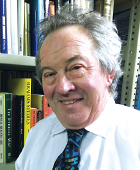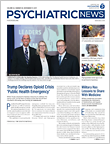At my 50th high school reunion about two years ago, an old friend wondered: “Steve, how’d you know you were going to be a psychiatrist way back in high school?” My answer was: my mother, my people, and myself. My ill Jewish mother wanted me to be a doctor serving the ill; my people valued Tikkun Olam, translated as trying to heal the world; and I had read Freud’s Interpretation of Dreams, a pathway to understanding and healing myself.
My first real-life test of this aspiration came through a psychology class at the University of Michigan that I took with my wife-to-be, Rusti. Our courtship included a practicum at Northville State Hospital back in 1966. It was both heartbreaking and heartwarming. I can—and still do—see me holding on to Rusti in an overcrowded ward, with patients just shuffling around, some menacing, shades of the movie “One Flew Over the Cuckoo’s Nest”.
From this fusion of compassionate love for the patients and romantic love of my wife, I pledged to try to get those patients out of such hospitals, to serve the most underserved, seriously mentally ill people.
It was in medical school at Yale that it became clear that I could be part of accomplishing those goals as a particular kind of psychiatrist, a community psychiatrist. My psychiatric rotation was at the renowned Connecticut Community Mental Health Center. That educational and service model of an academic institution partnering with the public sector led to my community psychiatry career, first based at Baylor College of Medicine in Houston, then at the Medical College of Wisconsin, where we came in part because my mother was dying nearby.
To my surprise, though, I encountered underserved people elsewhere: members of the military, patients in managed care systems, transgendered individuals, and individuals in jails and prisons. The same community psychiatry practices seemed to apply: administratively, use multidisciplinary staff of complementary skills, provide reasonable expectations, empower them, and “love” them.
As I aged, I also received booster shots of inspiration. Besides the everyday sunshine my wife of 49 years brings to everyone, I became inspired by the careers of other family members. Our daughter, Stacia, became a career counselor in universities for journalists and lawyers; our son, Evan, became a rabbi, spreading knowledge and pathways to spiritual happiness; and my sister, “Jo-Jo,” followed my father in becoming a lawyer and recently received a women’s leadership award in Chicago for her work.
There were many inspirational psychiatric colleagues—too many to discuss here. And, of course, there were those patients who recovered to one degree or another.
Along the way, various honors helped to balance the inevitable slings and arrows that come one’s way in whatever sort of love in which one is involved. In my case, they included being called “evil” and a “Nazi” by two prominent psychiatrists for my leadership of a managed care system, even if it was not-for-profit; bosses and a student who betrayed; and one accuser who said that I had “rescue fantasies,” for which I plead guilty as charged!
Five years ago, it felt like it was time to retire to Rusti—but once a community psychiatrist, always a community psychiatrist, because our knowledge and skills also apply to everyday life. So, when I was asked to help various community endeavors by serving pro bono on boards, addressing climate instability, advocating for a single payor system, presenting, blogging, and now editing a book on Islamophobia, how could I say no?
With the help of another colleague, the emergency physician Randall Levin, M.D., I also discovered a newly recognized underserved group, ourselves. We physicians are burning out at epidemic rates, as I apparently did in my workplace. I hope to contribute to the cause of eliminating burnout, especially as a member of APA’s Work Group on Wellness and Burnout. ■

